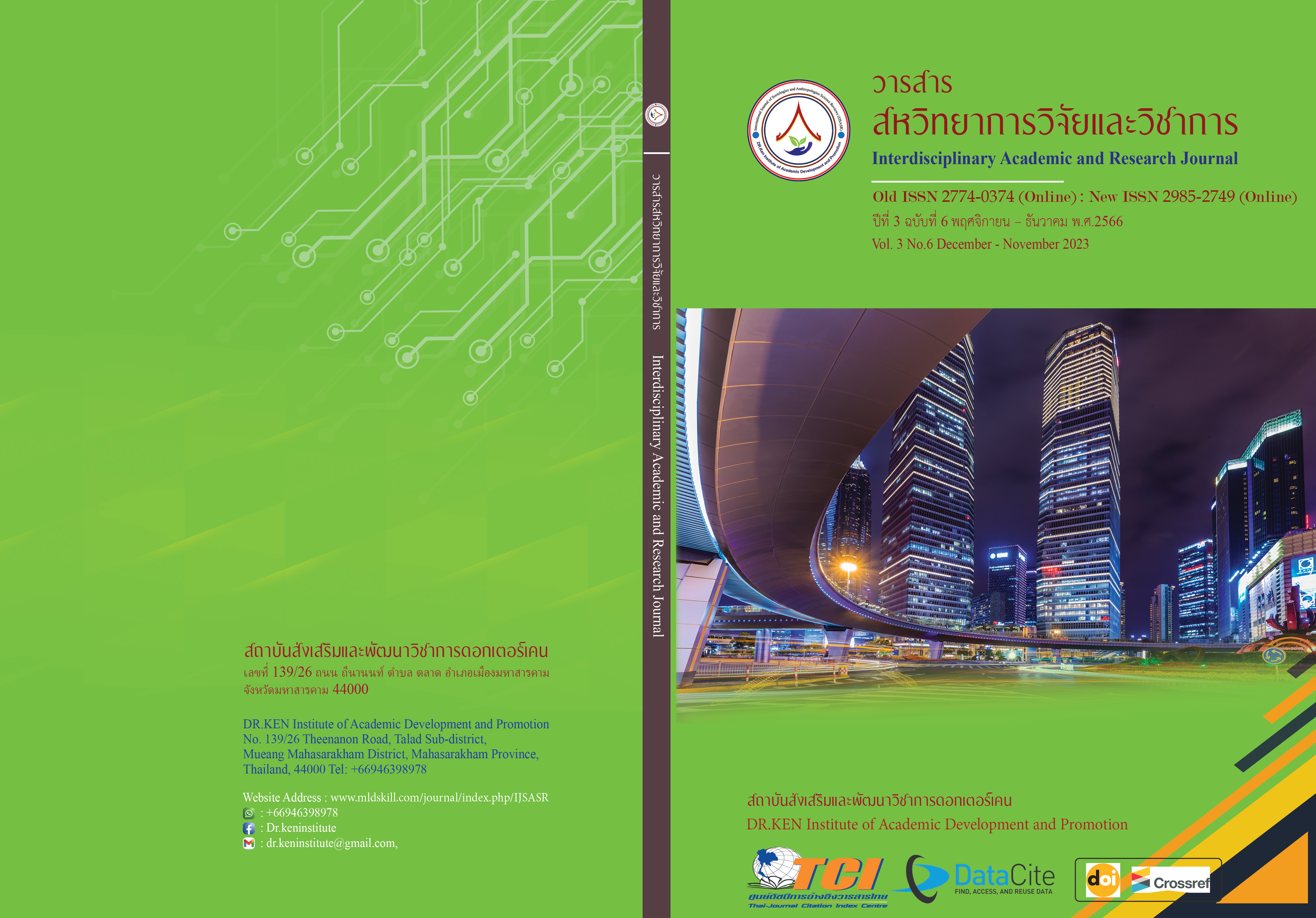Model of Applying the 4 Brahma Viharn Principles to Personnel Management in Organization
DOI:
https://doi.org/10.60027/iarj.2023.271451Keywords:
The 4 Brahma Viharn Principles; , Personnel Management; , OrganizationAbstract
Background and Aim: Managing cultural diversity, emotions, and differences in the workplace can be a problem when it's not possible to create an environment that is inclusive and receptive to diversity. This can lead to conflicts and disputes within the organization. This article aims to synthesize ideas about applying the 4 Brahma Viharn principles in personnel management, emphasizing the importance of everyone being aware of applying these principles. The 4 Brahma Viharn principles in personnel management are applied to align with the management responsibilities of those in positions of authority, ensuring that subordinates receive fairness and equitable treatment being able to receive recognition for one's work, wholeheartedly enjoying a sense of fairness and satisfaction, becomes a source of inspiration and motivation to put in physical and mental effort, driving the progress of the organization. This is the essence of the study's content.
Methodology: This study used document analysis and related research methods. Analyze the content and present it descriptively according to the study objectives.
Results: The 4 Brahma Viharn principles are exquisitely embodied, serving as noble qualities and virtues for adults. They are aimed at the highest righteousness, akin to the sublime Dharma, and are composed of 1) Maeta, love, and benevolent intentions wish for his happiness, well-being, a boundless mind, and thoughts that benefit all beings, human and animals alike. 2) Karuna, with compassion and sympathy, contemplates aiding in the liberation from suffering. Cultivate the intention to alleviate the intense and distressing afflictions of all sentient beings. 3) Mudita, the joy that arises when others are well and happy, with a clear and radiant mind, delighting in a state of contentment, is always openhearted and rejoicing for all sentient beings who are normally joyful. It blossoms further when they are well and thriving. And (4) Upekkha, the impartiality that remains centered, sustaining itself in righteousness as determined through discernment – possessing a composed and straightforward mind, balanced like the scales of justice, unswayed by attachment and aversion. Discerning the actions that all beings have performed, deserving of either positive or negative outcomes, by their intentions.
Conclusion: Buddhism creates 4 Dharma principles that indicate the mental qualities of adults. It consists of the qualities of loving-kindness, kindness, compassion, and equanimity, all of which aim at the highest dhamma and aim at creating good things to alleviate the suffering of all beings.
References
กรมการศาสนา. (2538). คู่มือการศึกษานักธรรมและธรรมศึกษาชั้นตรี. พิมพ์ครั้งที่ 5, กรุงเทพฯ : โรง พิมพ์การศาสนา.
กระทรวงศึกษาธิการ. (2548). การพัฒนาคุณภาพการบริหารการศึกษาตามระบบคุณธรรม. กรุงเทพฯ: โรงพิมพ์คุรุสภาลาดพร้าว
กิตต์ นิรันต์พานิช. (2554). จากใจให้คุณครูและนักบริหารทั่วไป. กรุงเทพฯ : บริษัท เพรส. มีเดีย จำกัด.
กิติพันธ์ รุจิรกุล (2529). พฤติกรรมผู้นาทางการศึกษา. กรุงเทพฯ : โอ.เอส.พริ้นติ้งเฮ้าส์.
เจริญ ไวรวัจนกุล. (2523). การบริหารบุคลากรทางการศึกษา. กรุงเทพฯ : โรงพิมพ์รุ่งเรืองรัตน์.
ชัยฤกษ์ วราวิทยา (2526). การบริหารโรงเรียนเบื้องต้น, กรุงเทพฯ : สานักพิมพ์โอเดียนสโตร์.
ธงชัย สันติวงษ์. (2525). การบริหารบุคคล. พิมพ์ครั้งที่ 2. กรุงเทพฯ : สานักพิมพ์ไทยวัฒนาพานิช.
บุรัญชัย จงกลนี. (2528), คุณธรรมของนักบริหาร. คณะศึกษาศาสตร์: มหาวิทยาลัยขอนแก่น.
พระครูวาปีจันทคุณ (อัศเจรีย์ พันธ์แก้ว). (2564). แนวทางการส่งเสริมหลักพรหมวิหารธรรมเพื่อสันติภาพ. วารสารเสฏฐวิทย์ปริทัศน์ 1(3),1-10.
พระธรรมปิฎก (ป.อ.ปยุตฺโต). (2545). พจนานุกรมพุทธศาสตร์ ฉบับประมวลธรรม. พิมพ์ครั้งที่ 11. กรุงเทพฯ : บริษัท สหธรรมิก จำกัด
พระราชวรมุนี (ประยุทธ์ ปยุตโต). (2528). พจนานุกรมพุทธศาสตร์ ฉบับประมวลคำศัพท์. กรุงเทพฯ : จุฬาลงกรณ์มหาวิทยาลัย.
พิทูร มลิวัลย์ (2528). หลักธรรมสาหรับการปกครอง. พิมพ์ครั้งที่ 2. กรุงเทพฯ : โรงพิมพ์การศาสนา.
ไพฑูรย์ มาเมือง. (2564). การบริหารตามหลักพรหมวิหารธรรมขององค์การบริหารส่วนตำบลชัยพฤกษ์ ตำบลชัยพฤกษ์ อำเภอเมืองเลย จังหวัดเลย. วารสารศรีล้านช้างปริทรรศน์, 7(1), 47-47.
Downloads
Published
How to Cite
Issue
Section
License
Copyright (c) 2023 Supakit Boonliang

This work is licensed under a Creative Commons Attribution-NonCommercial-NoDerivatives 4.0 International License.
Copyright on any article in the Interdisciplinary Academic and Research Journal is retained by the author(s) under the under the Creative Commons Attribution-NonCommercial-NoDerivatives 4.0 International License. Permission to use text, content, images, etc. of publication. Any user to read, download, copy, distribute, print, search, or link to the full texts of articles, crawl them for indexing, pass them as data to software, or use them for any other lawful purpose. But do not use it for commercial use or with the intent to benefit any business.
















.png)


